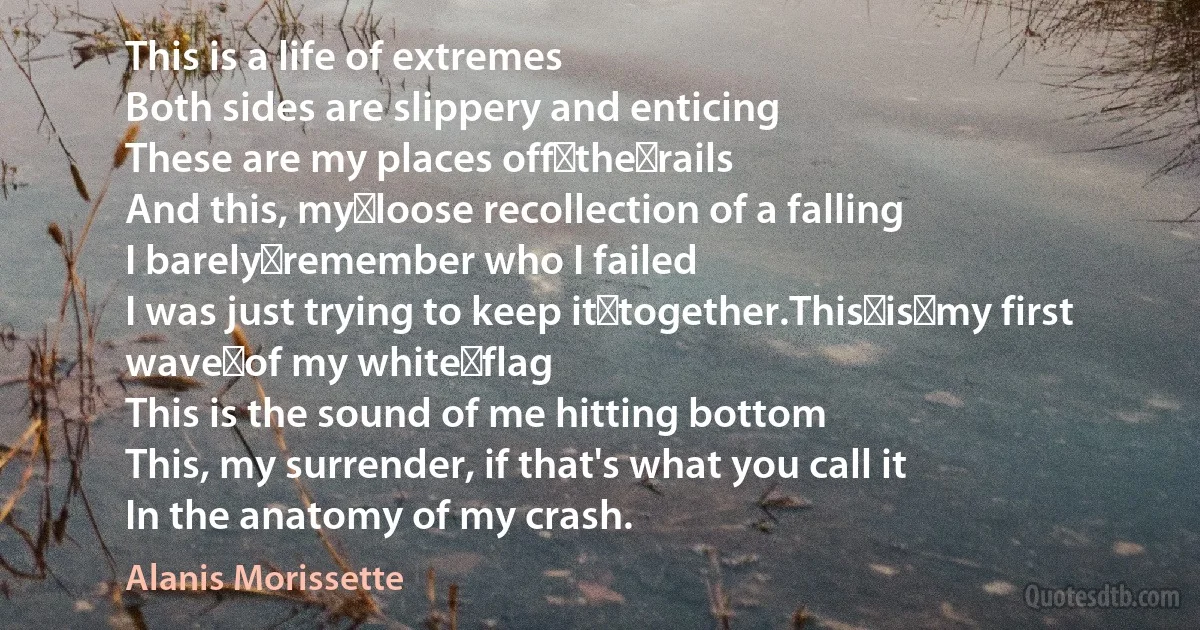Bottom Quotes - page 44
Whenever a storm with thunder and lightning moved over the sea, he would hurry out to the top of the cliffs as if he had a pact of friendship with the forces of nature, or even went on into the oakwood where the lightning had split a tall tree from top to bottom, which led him to murmur: 'How great, how mighty, how wonderful!'

Caspar David Friedrich
Whenever a storm with thunder and lightning moved over the sea, he would hurry out to the top of the cliffs as if he had a pact of friendship with the forces of nature, or even went on into the oakwood where the lightning had split a tall tree from top to bottom, which led him to murmur: 'How great, how mighty, how wonderful!'
Thus a friend remembered the wanderings of Caspar David Friedrich as a young painter on the Baltic island of Rugen in 1802. It was Friedrich's favorite posture: Homo romanticus out in the weather, saluting the crag.

Caspar David Friedrich
I think the characters I play go through tunnels, like in Three Colours : Blue, for example, where she's lost everything ... In The English Patient, she loses her best friend; this patient is dying in front of her – there's no hope, so she's going to start from the bottom. In films we see extremes, because it's where you have turning points. Before I thought there was a common denominator between my films - as if all my characters were sisters – but I'm not so sure now.

Juliette Binoche
In the year 1984 Forbes magazine, a leading periodical for high finance and big business, drew up a list of the wealthiest individuals in the United States. The top 400 people had assets totaling $60 billion. At the bottom of the population there were 60 million people who had no assets at all. Around the same time, the economist Lester Thurow estimated that 482 very wealthy individuals controlled (without necessarily owning) over $2,000 billion ($2 trillion). Consider the influence of such a very rich class-with its inevitable control of press, radio, television, and education-on the thinking of the nation.

Howard Zinn
Every animal in the creation excels us in something. The winged insects, without mentioning doves or eagles, can pass over more space and with greater ease in a few minutes than man can in an hour. [...] Even the sluggish snail can ascend from the bottom of a dungeon, where man, by the want of that ability, would perish, and a spider can launch itself from the top as a playful amusement. The personal powers of man are so limited, and his heavy frame so little constructed to extensive enjoyment, that there is nothing to induce us to wish the opinion of Paul to be true. It is too little for the magnitude of the scene; too mean for the sublimity of the subject.

Thomas Paine
It's more difficult, you know, to bring about positive change than it is to make money. It's much easier to make money, because it's a much easier way to measure success - the bottom line. When it comes to social consequences, they've got all different people acting in different ways, very difficult to even have a proper criterion of success. So, it's a difficult task. Why not use an entrepreneurial, rather than a bureaucratic, approach. As long as people genuinely care for the people they're trying to help, they can actually do a lot of good.

George Soros
I certainly will not reject the praise you bestow upon me for having stimulated in many instances, not only in Italy but perhaps beyond its confines also, the pursuit of studies such as ours, which have suffered neglect for so many centuries; I am, indeed, almost the oldest of those among us who are engaged in the cultivation of these subjects. But I cannot accept the conclusion you draw from this, namely, that I should give place to younger minds, and, interrupting the plan of work on which I am engaged, give others an opportunity to write something, if they will, and not seem longer to desire to reserve everything for my own pen. How radically do our opinions differ, although, at bottom, our object is the same! I seem to you to have written everything, or at least a great deal, while to myself I appear to have produced almost nothing.

Petrarch
It is human nature to want to exchange ideas, and I believe that, at bottom, every artist wants no more than to tell the world what he has to say. I have sometimes heard painters say that they paint 'for themselves': but I think they would soon have painted their fill if they lived on a desert island. The primary purpose of all art forms, whether it's music, literature, or the visual arts, is to say something to the outside world; in other words, to make a personal thought, a striking idea, an inner emotion perceptible to other people's senses in such a way that there is no uncertainty about the maker's intentions.

M. C. Escher
far be it from me to say or insinuate a word of disparagement against such characters as Hampden, Elliot, Pym; whom I believe to have been right worthy and useful men. I have read diligently what books and documents about them I could come at;-with the honestest wish to admire, to love and worship them like Heroes; but I am sorry to say, if the real truth must be told, with very indifferent success! At bottom, I found that it would not do. They are very noble men, these; step along in their stately way, with their measured euphemisms, philosophies, parliamentary eloquences, Ship-moneys, Monarchies of Man; a most constitutional, unblamable, dignified set of men. But the heart remains cold before them.

Thomas Carlyle
Sometime afterward, a terrible misfortune occurred which was in no way calculated to allay the superstitious fears of the ignorant. As some eight or ten citizens were returning with the ferry-boat which had crossed the last Mormons over the Missouri river, into Clay county, the district selected for their new home, the craft filled with water and sunk in the middle of the current; by which accident three or four men were drowned! It was owing perhaps to the craziness of the boat, yet some persons suspected the Mormons of having scuttled it by secretly boring auger-holes in the bottom just before they had left it.

Josiah Gregg
The silver which is taken from the furnace, generally contains an intermixture of gold, averaging from ten to thirty per cent.; but what is extracted by amalgamation is mostly separated in the washing. While in a liquid state, the gold, from its greater specific gravity, mostly settles to the bottom: yet it usually retains a considerable alloy of silver. The compound is distinguished by the name of oroche. The main portion of the silver generally retains too little gold to make it worth separating.

Josiah Gregg
Subconsciously or unknowingly, it plays out in our attitude towards professionalism and commitment to work. The male artistes put in more to attain the heights they get to. I cannot say the same for the women and I am guilty as charged. There are lots of other distractions, both natural and artificial, but the bottom line is that if women put in as much effort as men do, there would be equal results.

Muma Gee
The most important mine of Jesus-Maria at this time was one called Santa Juliana, which had been the means of alternately making and sinking several splendid fortunes. This mine had then reached a depth of between eight and nine hundred feet, and the operations were still tending downwards. The materials were drawn up by mule power applied to a windlass: but as the rope attached to it only extended half way down, another windlass had been erected at the distance of about four hundred feet from the mouth of the cavern, which was also worked by mules, and drew the ores, etc., from the bottom. On one occasion, as I was standing near the aperture of this great pit, watching the ascent of the windlass-rope, expecting every moment the appearance of the large leathern bucket which they employ for drawing up the minerals as well as the rubbish and water from the bottom, what should greet my vision but a mule...

Josiah Gregg
One of the great reasons why I belong to the Labour Party and hold the Socialist views of what a wise and just social structure is, is because I detest class politics and want to end them in real national unity. In bringing that about we have to consider the claims of the great mass of our people, who, on account of their poverty, cannot adequately protect themselves. What has national unity meant to them? A change in a machine can make them outcasts; a change in fashion can make them paupers... The Labour Party wants to bring within the bounds and the meaning of this national unity the bottom dog, as he is called. For this purpose we have organised our great public services. The Labour Party wishes to develop them.

Ramsay MacDonald
Others taunt me with having knelt at well-curbs
Always wrong to the light, so never seeing
Deeper down in the well than where the water
Gives me back in a shining surface picture
My myself in the summer heaven, godlike
Looking out of a wreath of fern and cloud puffs.
Once, when trying with chin against a well-curb,
I discerned, as I thought, beyond the picture,
Through the picture, a something white, uncertain,
Something more of the depths – and then I lost it.
Water came to rebuke the too clear water.
One drop fell from a fern, and lo, a ripple
Shook whatever it was lay there at bottom,
Blurred it, blotted it out. What was that whiteness?
Truth? A pebble of quartz? For once, then, something.

Robert Frost
We must understand that no party in the country can with success base itself on or identify itself with one social element or class. To be successful we have still to reorganize from top to bottom the social structure on which our party rests. We agree that in the modern world great extremes of poverty and wealth shall be replaced by an infinite variety of plenty.

Rab Butler
What am I? I am the desire not to die. I have always been impelled - not that evening alone - by the need to construct the solid, powerful dream that I shall never leave again. We are all, always, the desire not to die. This desire is as immeasurable and varied as life's complexity, but at bottom this is what it is: To continue to be, to be more and more, to develop and to endure. All the force we have, all our energy and clearness of mind serve to intensify themselves in one way or another. We intensify ourselves with new impressions, new sensations, new ideas. We endeavour to take what we do not have and to add it to ourselves. Humanity is the desire for novelty founded upon the fear of death. That is what it is.

Henri Barbusse
The third general fact on which this theory is founded, is, that the stratified rocks, instead of being either horizontal, or nearly so, as they no doubt were originally, are now found possessing all degrees of elevation, and some of them even perpendicular to the horizon; to which we must add, that those strata which were once at the bottom of the sea are now raised up, many of them several thousand feet above its surface. ...This force, which has burst in pieces the solid pavement on which the ocean rests, and has raised up rocks from the bottom of the sea, into mountains... exceeds any which we see actually exerted, but seems to come nearer to the cause of the volcano or the earthquake than to any other, of which the effects are directly observed. The immense disturbance, therefore, of the strata, is in this theory ascribed to heat acting with an expansive power, and elevating those rocks which it had before consolidated.

James Hutton



